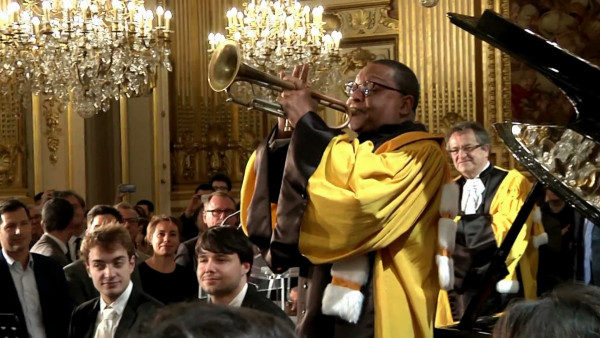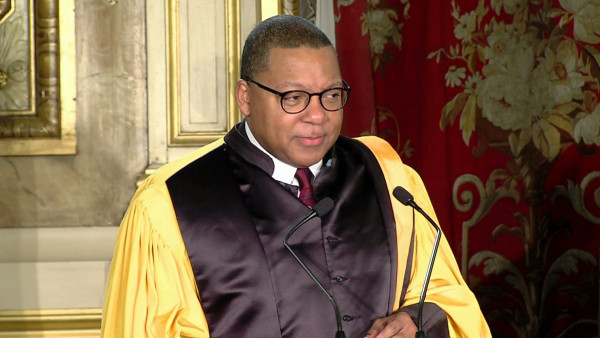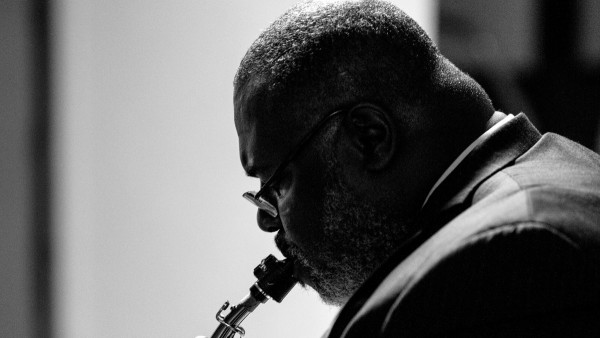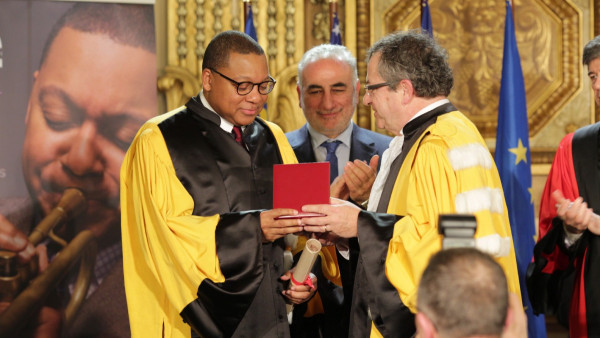Wynton Marsalis’ acceptance speech at University Jean Moulin Lyon3
Deputy Mayor Georges Kepenekian, University President Jacques Comby, University Vice-President Alain Asquin, the Nova Ensemble, students, faculty and colleagues and respected guests. I am deeply honored to receive this distinction. Thank you Mr. Asquin for you kind and extensive comments on my behalf.
As a native of New Orleans, I am a proud member of the extended family of France. In New Orleans, we still speak Creole, eat baguettes and beignets, drink café au lait, and fret over making the perfect roux to give soul to our gumbo. We live by a credo expressed in French, “laissez les bon temps rouler”.
As a trumpeter, I am one of the many descendants of the great Frenchman, Maurice André, whose sparkling sound and buoyant rhythm caused so many people to become devotees our noble instrument. Mr. André ‘s journey from a coal mining family to the concert stage, coupled with his absolute dedication to excellence, (as evidenced on his many recordings) gave me the inspiration, at 13 years old, to begin studying not only classical trumpet, but the history and culture of France.
In the course of these studies, I was fortunate to be enlightened as a player and student by the works of the distinguished line of French music masters, from Rameau to Dutilleux, whose sacrifices and contributions add another much needed dimension to personality of music in the world.
In the 20th century, many composers of this line rejected the snobbery and prejudice that was commonplace at that time to express an affinity and deep respect for jazz. The great Maurice Ravel immediately comes to mind, as does Darius Milhaud, who was perhaps the greatest influence in the life and work of jazz man Dave Brubeck. Milhaud was instrumental in helping shape the young Brubeck into the great musician, composer, ambassador, and champion of human rights that he became.
I cannot fully express my gratitude for this honor without acknowledging the deep and lasting imprint of French culture and scholarship on the identity of jazz. This relationship started with the embrace of Afro American musician James Reese Europe, and members of the 369th Infantry “Hellfighters” band from Harlem. Due to segregation in the American Armed Forces, this unit was repeatedly barred from joining the fight. France however, proposed that they join the French Army, which they were allowed to do, thus becoming the first American unit to join a French combat force in the Great War. And they were very effective. From this point, there has been a love, in this nation, of syncopation, the blues, and a celebration of the American spirit of improvisation.
After the War, Will Marion Cook’s “Southern Syncopated Orchestra” brought the New Orleans genius of the clarinet and soprano saxophone, Sidney Bechet here. Bechet would go on to touch this country’s soul with his unique sound and approach, and he became a beloved national cultural hero when he relocated permanently here in 1950.
In the 1930’s, the fabled “Hot Club of France” galvanized the aspirations of jazz fans all over the country. This group of Hugh Panassie’, Charles Delaunay and three other students were dedicated advocates for the music. They were instrumental in building the foundation for the French jazz scene, making significant contributions both on and off the bandstand.
They launched the Quintet of the Hot Club of France, with Stéphane Grappelli and Django Reinhardt, whose virtuosity and deep swing demonstrated that Jazz had arrived on the world stage as an international musical language.
Charles Delaunay, authored the first jazz discography, and along with Mr. Panassie founded Jazz Hot Magazine. This publication, started in 1935 is still going strong.
These mere ‘students’ from the Lycée Carnot, actually established the very first Jazz Record Company in the world, Swing Records. Their inaugural release featured an integrated band including young French masters Django and Grapelli playing with distinguished Americans Benny Carter and Coleman Hawkins.
After the Second World War, the International Festival of Jazz in Paris brought over Charlie Parker, Miles Davis, Hot Lips Page, and Sidney Bechet as headliners. This festival, welcoming the styles of different generations, showcased jazz as serious art with a meaningful tradition, not as a popular fad requiring new tricks like a circus act.
As we moved into the American Civil Rights Era, every serious jazz musician pursued a meaningful relationship with French culture and audiences. So many great albums were made here; from “Dizzy on the French Riviera” in 1962, to “Miles in Antibes” in 1963, to Duke Ellington and Ella Fitzgerald’s live recordings in Juan-les-Pins in 1967. Jazzmen and women knew that this was a place that appreciated and embraced our music, and that afforded some of the freedoms denied us in the America of that time.
My personal relationship with this country began with the Grande Parade du Jazz in Nice in the early 80’s, and extended to the many great summer festivals that, although now slowly losing financial support and artistic substance, still exist up and down France. I have had the honor of performing, teaching, and living a portion of my life in this lyrical country, and have been blessed to build a deep bond with Marciac, a southwestern village that has enriched my life and taught me more than I can even express.
These are difficult times for the arts, and particularly for music all over the world. It has been devalued and vulgarized under the banner of “give the people what they want”, and has been particularly destructive to our young. For many reasons, ‘what is seen’ in the contemporary climate is often as important, or more important, than ‘what is heard’. Let us remember that kids need substantive and truly great music, perhaps even more than their elders. Over the past 60 years or so, we have increasingly reduced them to a ‘market’ with hormones and disposable income, and a ‘gullible if complimented’ group who are lead far too easily and willingly in the direction of things that lack meaning and depth. This cynical exploitation of inexperience is destructive to the regeneration of musical meaning and ultimately to the cycle of life itself.
Teachers, philosophers, students and artists must remain vigilant in pursuit of higher and higher quality. This is no time to retreat into the academy or into the private world of cognoscenti and other elites. It’s important for us to be in the conversation and thoughts of the average citizen, and equally important to share our knowledge and taste, popular or not. We must be willing to listen, but also courageous enough to speak unapologetically. Of course, no one can be forced to enjoy good music, but the long uphill struggle against a very powerful, timeless corruption of musical taste is worth waging because, as we clearly see today, the consequences of not caring are very dire. And the loss of musical meaning and identity across time portends to an even darker future.
Music is such an accurate measure of communal aspirations. It urges us to galvanize around its important mission and to inspire our students and younger people to endeavor to pursue excellence. The best of our traditions and our mutual interests impel us to motivate them to take pride in this excellence and to recruit others across cultures to carry it into the future with the confidence and open mindedness of the enlightened and the educated.
As regards France and its musical impact on the Americas, this commission goes way back, even before jazz itself, with Louis Moreau Gottschalk and Edgar Degas, and Erik Satie, and so many nameless Creoles who sang plaintive and joyous songs with a beat and a popular dance step, and a heart set on all types of freedom. Jazz is America’s return on a portion of that French musical heritage. From the freedom to speak, to the freedom to love, to the freedom to be, it’s all there in that music, and all of it belongs to all of us.
Thank you.




